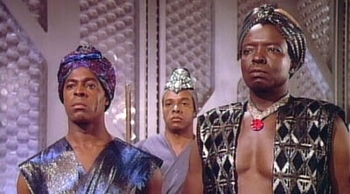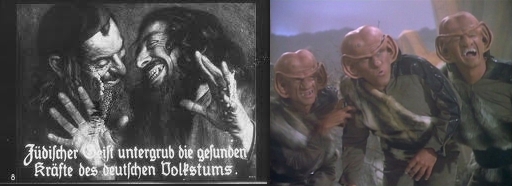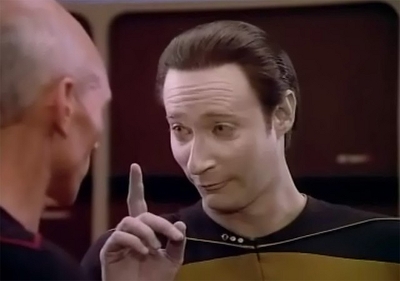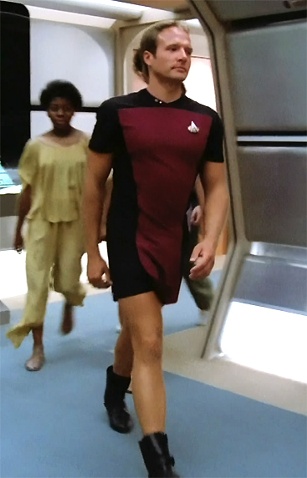I’m examining the impact Star Trek: The Next Generation had on my formation. The introduction to this series can be seen here.
Where No One Has Gone Before
An engine efficiency expert and his assistant come aboard to test and adjust the warp engines. But when they accidentally transport the Enterprise millions of light years away, the crew must brave an area of space where thoughts easily become reality.
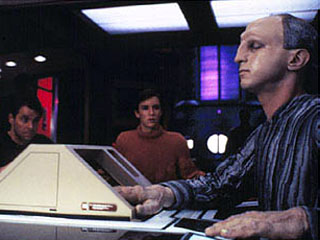 Other important plot points here: In this episode Wesley forges a bond with the engine expert’s assistant, who we come to know as the Traveler. The Traveler is a mysterious being who can alter time and space with his thoughts. The Traveler will remain an important part of Wesley’s journey, and here offers exposition that characterizes Wesley as a kind of Mozart figure, set apart as having a unique gift to offer the galaxy.
Other important plot points here: In this episode Wesley forges a bond with the engine expert’s assistant, who we come to know as the Traveler. The Traveler is a mysterious being who can alter time and space with his thoughts. The Traveler will remain an important part of Wesley’s journey, and here offers exposition that characterizes Wesley as a kind of Mozart figure, set apart as having a unique gift to offer the galaxy.
ALRIGHT. Let’s talk about Wesley. I’ve been hesitant to do so, because he evokes some strong feelings. but we’re going to have to address this issue. Yes, he is a proxy for the author 2, bordering on a Mary Sue character. Yes, he advanced from not being allowed on the bridge to being a bridge officer in record time. Yes, the writers probably relied on him as a deux es machina device too often by the end of the run. But a) his characterization is not lacking any more than anyone else’s so far, which makes him more of an “identified patient” and scapegoat than a true weak link, and b) more importantly, his character may be “queerest” of the regular crew, thus making him critical to the health of the system. He is:
1) not yet fully indoctrinated into a structure that deeply values control, and is thus more “chaotic” and less trusted for that;
2) his age and lack of experience place him in a position of having little power in the hierarchy, so he is often voiceless, offering observations and insights of value which are frequently (and sometimes gleefully) ignored;
3) he has gifts that befuddle and confuse others, apparently understanding science and math beyond what others his age have mastered; he is othered for this, amongst his peers and colleagues in the show and by many audience members;
4) he’s an awkward teenager, making many of the same mistakes people in growth processes make, which apparently pained both crew and much of the audience, who treated him as a great danger to the quality of the show.3
The Wesley hate hit me hard as a kid. I related to him because of his smarts, his age, his awkwardness and his otherness. Seeing his uncensored joy at being allowed onto the bridge gave me a way to be there vicariously. So hearing about the alt.Wesley.Crusher.die.die.die group and seeing “Shut up Wesley!” t-shirts felt just like brutal bullying to me, and honestly still does4. He was the quintessential, unironic nerd; the central difference between him and the successful nerd characters of, say, The Big Bang Theory today, is that we are meant to laugh both with and at those guys. They know their place in the established social hierarchy, and are willing to be self-depracating. But Wesley wasn’t cool enough to be in on the joke, and didn’t always know his place. The fact that Wesley was a target for so much hate amongst Trek fans made me feel unwelcome in the fandom at the time, and has mirrored other experiences I’d have later of being marginalized further within already marginalized communities (for being bi/omnisexual in gay community, for valuing sex in Christian communities, for valuing spirituality and consent in bdsm communities, etc.) I can’t help but feel that there was a great deal of self-hatred and difference-based shaming fueling the Wesley hate.
The idea that “space, time and thought aren’t as separate as they appear to be” is a secret the Traveler and Wesley share in their exploration here, and they perceive it as a dangerous one. The writers explore the idea that thought is the basis of all reality, and this was my first exposure to it. It’s thematically related to a lot of mind/body dualism that will infuse the series, and I actively reject that kind of thinking, but there was at least a moment here where Picard was practically asking the entire ship to pray for the Traveler. That wouldn’t have registered for me at the time, though this will certainly all add fuel to my explorations of theodicy and magick/prayer just a few years after I watched this.
In this episode’s other news: despite (or because of) no one listening when Wesley had important information to share, this episode ends with him being made an acting ensign and being given bridge duties. We see some fantastical and inspiring new starcapes, making life in space even more alluring to my young self. The Traveler models a wandering lifestyle of the future, apparently living outside any regimented life like Starfleet and hitching rides to bounce around looking for people like Wesley. And once again, Picard gets a chance to focus on the critical importance of controlling our thoughts, when they find themselves capable of conjuring beasts from the Klingon homeworld, deceased aunts, and raging fires.
1. Photo courtesy of http://www.startrek.com/database_article/traveler.
2. Star Trek creator Gene Roddenberry’s middle name was Wesley, and he’s on record as saying Wesley was patterned after his own memories of being a kid.
3. At first, I would characterize Wesley as inhabiting a kind of queer space without meaning to. Certainly, at this point, his fondest wish would be to assimilate into his mainstream culture. It is not his intention, at this point in time, to subvert that culture or reject the privileges it promises. The level of intentionality that Wesley brings to his queering actions is a subject that will unfold in more complex ways toward the end of his character’s run on the show.
4. I understand just not liking a character, and I don’t believe there’s anything ethically wrong with just not liking Wesley, or finding elements of him to be poorly written. I don’t believe that run-of-the-mill indifference or annoyance fuels movements like what Wesley hate was, though, and I firmly believe there were some nasty systemic shit going on there.
1) At someone’s mention of Sherlock Holmes, Data immerses himself in both study and embodiment of Holmes… complete with pipe, melodramatic vocal cadences and Holmesian catchphrases. It’s the kind of experimentation with selfhood that kids (and, I’d argue, many adults) crave as a healthy part of their development, and it’s something I didn’t really have permission to do in my family of origin. It had a positive effect on me to see such enthusiastic exploration in a “serious†setting like the Enterprise (and further endeared Data to me). Part of what Data seemed to relish was solving a mystery – pushing back against an unknown to see what could be discovered about it.

